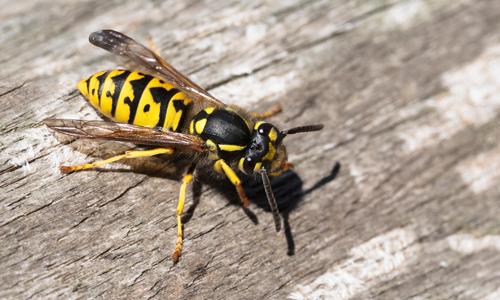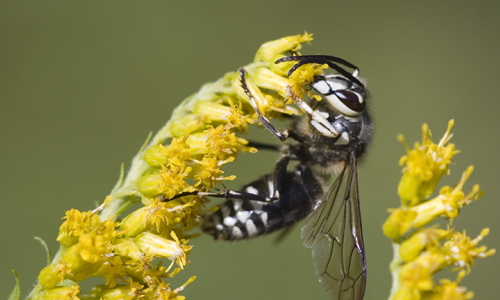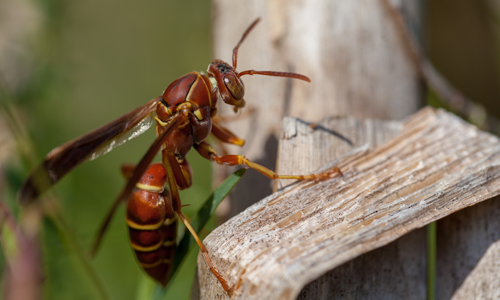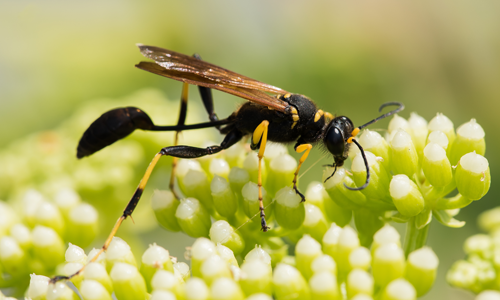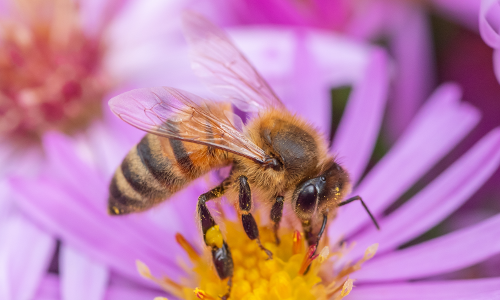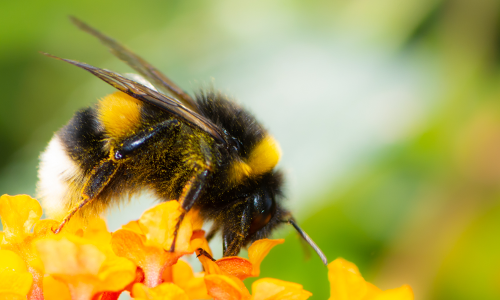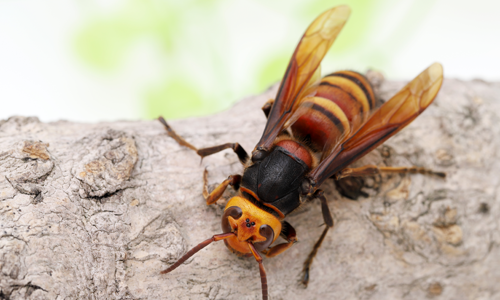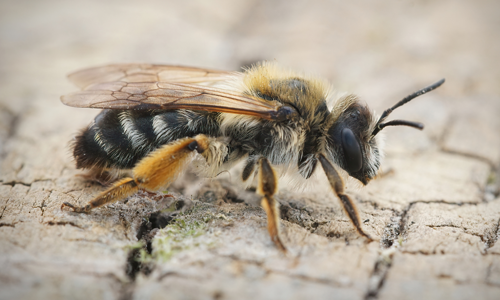In Washington state most wasps and bees are fairly harmless and will leave you alone if they are not disturbed. But there are a few that you will want to watch out for. Knowing the difference will help in protecting you and your family and being able to reduce our impact on the environment whenever possible
Yellow Jackets (Vespula species) – are characterized by the black and yellow striped pattern and a general nasty demeanor. Yellow jackets towards the end of summer will aggressively defend their nest, which can be an enclosed nest in a tree, inside a wall of a home or in an old rodent burrow. Catching the nests early in the summer is essential at reducing some unanticipated interactions with them that will be hard to forget.
Bald Faced Hornets (Dolichovespula maculata) – a cousin of the yellow jackets but a little larger with black and white stripes. Bald faced hornets almost always create their nests on tree branches waiting for the unsuspecting person to walk right under them.
Paper Wasps (Polistes species) – are very common at forming open honeycomb nests in the eaves of a home. As the colonies begin to grow the wasps can become more and more protective of their nests and then people can be stung. These wasps have a very tight waist and often have some red in their colorization.
Mud Daubers (Sceliphron caementarium) – look like Paper Wasps but are solitary wasps that form mud tubes in the attics and eaves of homes. They are often considered beneficial insects because they are not aggressive and will parasitize spiders and store them in the mud tubes with their eggs.
Honey Bees (Apis melifera) – are the beneficial common honey bees that we use to fertilize our crops and agriculture. Rarely are they aggressive and they are the only stinging insect that survives the winter. If a swarm develops around your home, please let us know and we will try to rescue the colony.
Bumble Bee (Bombus species) – are the largest “furrry” bees that are very common in Washington state. They are active in the early spring and pretty much leave people alone unless someone stumbles onto an activity hive.
Asian Giant Hornet (Vespa mandarinia) – Recently in the news because of sightings along the border of Canada. While a significant concern, it is still unlikely that it will spread into our area.
Mining Bees and Mason Bees – are solitary bees that help pollinate plants and while they can sting they rarely do unless one works its way up into a person’s clothing and get trapped.
As we service your homes and businesses, we strive to determine which wasp or bee could be a concern towards your health while minimizing the impact that we have on the beneficial insects.
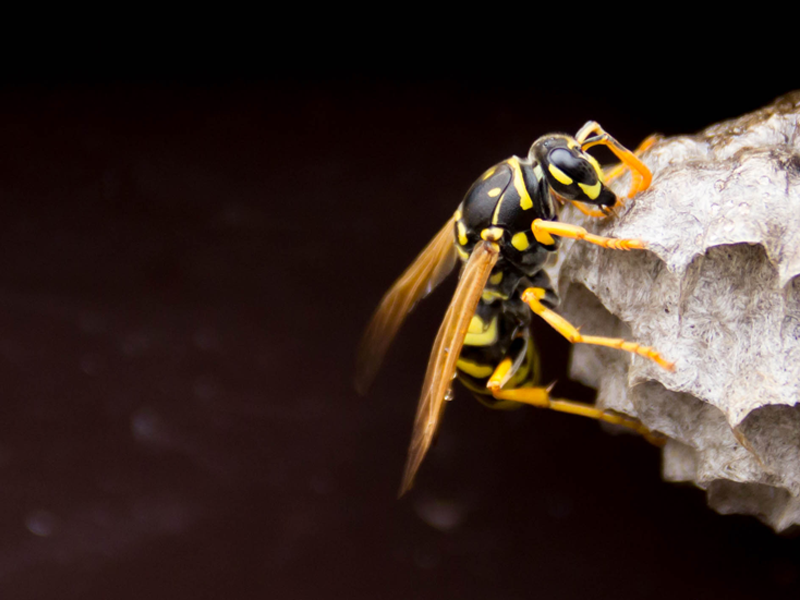
Washington
Wasp Control
In Washington state most wasps and bees are fairly harmless and will leave you alone if they are not disturbed. But there are a few that you will want to watch out for.
Knowing the difference will help in protecting you and your family and being able to reduce our impact on the environment whenever possible
What Are They?
Compared to the city rat (the Norway Rat), the Roof Rat is a smaller more agile rodent that was introduced into the Seattle area around the 1940’s.
In the past 15 years, the Roof Rat population has exploded throughout Western Washington and has now become a real threat to both your home and the environment.
Roof Rats get their name “Roof” from about a hundred years ago when they would live in the roofs of homes in California and would feed off oranges and other fruit trees nearby.
Recently Roof Rats have discovered that the Pacific Northwest also has plenty of other great food resources and that they can easily live in the insulation of your attics and crawlspaces.
What Do They Do?
The Roof Rat is an invasive rodent that originally comes from the jungles of Asia, and as such loves to climb and live in the vegetation around your home and any nearby greenspaces.
If there are trees or vegetation touching the side of the home, then the rats will quickly access the roof and chew their way into the insulation.
In the crawlspaces, once they find a way in, they will run underneath the flooring and within a year or two will completely destroy the insulation.
Properly replacing the insulation in a crawlspace or attic can easily cost between $5000 to $7000.
Addressing pest control issues preventatively can be a much more cost-effective approach for a homeowner than ignoring it and hoping it goes away.
If you want more information about what you can do today to mitigate the damage being done to your home, give us a call or fill out the quick quote below.
We will happily answer any questions you have.
Do you Exterminate and Repair the Damage?
Many companies will offer you a pest clean-out, but do not resolve the original problem.
Others will exterminate the pests but leave you with the cleanup and repair.
Green City Pest Control has comprehensive plans to eradicate, clean out and repair the damage to your home.
Give us a call, we would more than happy to walk you through our services and processes.
I'm Worried About My Enviroment
Our programs are designed around a green approach.
We also offer a monthly pest control service for challenging pest control problems, which was one of the first offered locally.
This reduces the use of pesticides overall and is more family and pet friendly.
Please call our office listed below for more details.
What Areas Do You Service?
We are a locally owned and operated pest control company serving the greater Seattle region. We are based out of the Maple Valley Washington area but service within 20 miles of our main location.
Auburn, WA
98001, 98002, 98030, 98042, 98092, 98390, 98391
Everett, WA
98201, 98203, 98204, 98205, 98207, 98208, 98272, 98275, 98290, 98294
Federal Way, WA
98001, 98003, 98023, 98063, 98093
Kent Washington, WA
98030, 98031, 98032, 98038, 98042, 98051, 98055, 98092, 98188, 98198
Maple Valley, WA
98038
Renton, WA
98055, 90056, 98057, 98058, 98059
Seattle, WA
ALL ZIP CODES
CALL TODAY
1-425-413-9780
![]()
Each home has its own unique design which requires us to take the time to understand and investigate what is going on so that our team can assess and design the right solution.
We take this very seriously and treat each home like it was our own.
After our visit we will provide you with a detailed report and a list of options to consider.
We have various plans that have been developed over time to make sure your pest problem is eliminated efficiently and safely.
We are the company to call when you want it done right.
With over 30 years of experince and a masters degree in pests, we bring a level of knowlege very few can replicate.
We believe you will be happy with our eco-sensitive approach and results.
What Are Your Qualifications?
Our pest control technicians are certified, bonded and licensed with up to 30+ years of experience.
The owner is one of the only Board Certified Urban Entomologist with a Master’s Degree from Purdue University.
Unlike most pest control companies that teach their technicians how to just spray.
We take the time to teach ours how the pests think and react to give you the best results possible.
How Does This Work?
Give us a call or fill out the free quote for tips on what you can do to minimize the damage being done to your home.
We will setup an in-home visit to get an idea on how best to tackle your problem and answer any questions you might have.
Once we know what we are dealing with, we will give you a detailed report and final cost estimate for your approval.
What Happens During My Home Visit?
After discussing any signs of infestation we will collect any and all historical data relating to your pest infestation.
Then our extensively trained technician will carefully survey and evaluate your home, inside and out.
We will be looking for potential entry points and signs of pest activity that are often missed by the untrained eye.
On the initial visit, we can sometimes spend up to 2 hours inspecting your entire home and might include buildings around your perimeter.
Fill out the form below to get cost and learn more about what you can do today.
What Will You Be Looking For?
It is essential to be thorough in this visit, therefore, we will also be happy to inspect your property for not only the pest that you originally contacted us about, but also all common pests like rats, mice, carpenter ants, nuisance ants, spiders, wasps, bees, cockroaches, birds, powder post beetles and other crawling insects.
We will inspect the attic, crawl space and other areas to investigate and determine what and where your problems begin and how best to solve them.
Fill out the form below for rat control costs and to learn about what you can do today to mitigate the damage being done to your house.
How Will I Know What You Find?
Our Technician will discuss all the findings from our inspection and the appropriate course of remediation of your current pest infestation. This typically includes informing you of which methods you can initiate on your own or with our help to persuade pests from inhabiting your residence.
This will include giving you a final report with photos that will comprehensively outline all treatments in all necessary areas.
This report includes holes, any current damage and a list of necessary repairs that you can do yourself or have our licensed team come and do for you.
Give us a call or fill out the form below to get started.
What is your Eco-sensitive Approach?
Anyone with a little training can pour chemicals in a sprayer and coat your home to eliminate pests. This works well for the cheaper pest control companies out there.
Our approach starts with the reducing the impact we leave on your home and enviroment. By training our technicians to understand the behavior and the biology of the pests involved we can have a more targeted approach. By understanding how rodents think and react we minimize the amount of chemicals used.
We also use chemicals with a lower risk for your family and are more sensitive to the enviroment.
We want to leave as small of a footprint as we can while eliminating your problem.
We are not the cheapest solution, we are the company you call when you want it done right.
What Do Our Customers Say?
GET A FREE QUOTE
Also Get Tips on What You Can
Do Today to Reduce the Damage Being Done to Your Home

